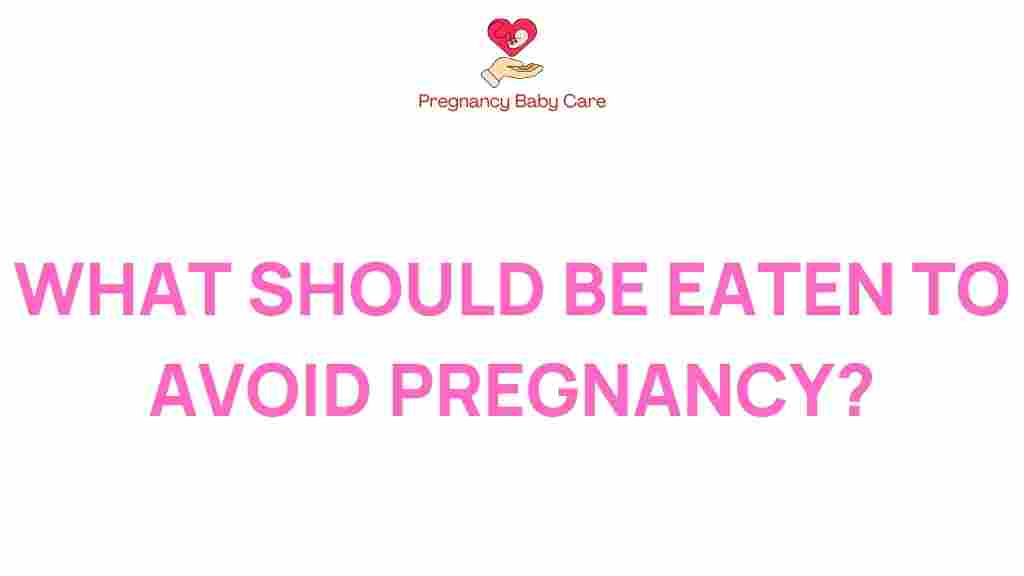Uncovering the Secrets: What Foods Can Help Prevent Pregnancy?
When it comes to pregnancy prevention, many people focus on traditional methods such as contraceptives, but did you know that your diet can also play a significant role? In this article, we will explore the fascinating connection between nutrition and fertility, revealing what foods can help in preventing pregnancy. Along the way, we will provide health tips and discuss various lifestyle choices that can further enhance your efforts in managing reproductive health.
Understanding the Link Between Diet and Pregnancy Prevention
Diet can significantly influence hormone levels, ovulation, and overall reproductive health. While no food can guarantee pregnancy prevention, certain foods may support your body in maintaining hormonal balance and reducing the likelihood of unintended pregnancy. Here are some key factors to consider:
- Hormonal Balance: Certain foods can help regulate hormones, which is crucial for preventing ovulation.
- Anti-Inflammatory Properties: Foods with anti-inflammatory effects can support reproductive health.
- Nutritional Deficiencies: A lack of specific nutrients can impact fertility and hormonal function.
Foods That May Help Prevent Pregnancy
Here’s a comprehensive look at various foods that can aid in pregnancy prevention:
1. Citrus Fruits
Citrus fruits like oranges, lemons, and grapefruits are rich in vitamin C, which is essential for hormone regulation. They may help keep your hormonal levels balanced.
2. Whole Grains
Whole grains such as oats, quinoa, and brown rice are high in fiber, which can help regulate insulin levels and maintain hormonal balance.
3. Leafy Greens
Foods like spinach, kale, and collard greens are rich in magnesium, which may assist in reducing the risk of ovulation.
4. Legumes
Beans, lentils, and chickpeas are excellent sources of fiber and protein, aiding in hormonal balance and overall reproductive health.
5. Nuts and Seeds
Almonds, walnuts, flaxseeds, and pumpkin seeds are packed with essential fatty acids and nutrients that can help regulate hormonal functions.
6. Berries
Berries like strawberries and blueberries are high in antioxidants, which can help reduce inflammation and support reproductive health.
7. Fish Rich in Omega-3 Fatty Acids
Fatty fish such as salmon and sardines can help maintain hormonal balance and support overall health.
Supplements for Pregnancy Prevention
In addition to whole foods, certain supplements can also support pregnancy prevention:
- Vitamin D: Supports reproductive health and hormonal balance.
- Omega-3 Fatty Acids: Helps regulate hormones and reduce inflammation.
- Folic Acid: Essential for overall reproductive health.
Step-by-Step Process for Incorporating These Foods into Your Diet
To effectively incorporate these foods into your diet, follow these steps:
- Assess Your Current Diet: Take note of your current eating habits and identify areas for improvement.
- Create a Balanced Meal Plan: Aim to include a variety of the foods mentioned above in your weekly meal plan.
- Shop Smart: Make a shopping list prioritizing whole foods, fresh fruits, and vegetables.
- Cook at Home: Preparing your meals allows you to control the ingredients and make healthier choices.
- Stay Hydrated: Drink plenty of water to support overall health and digestion.
- Monitor Your Wellbeing: Pay attention to how your body responds to these changes in your diet.
Additional Lifestyle Choices for Effective Pregnancy Prevention
Alongside dietary changes, certain lifestyle choices can enhance your pregnancy prevention efforts:
- Regular Exercise: Engaging in physical activity can help regulate hormones and maintain a healthy weight.
- Avoiding Alcohol and Tobacco: These substances can negatively affect hormonal balance and fertility.
- Stress Management: Practice stress-reducing techniques such as yoga, meditation, or deep breathing exercises.
- Regular Health Check-Ups: Stay updated with your reproductive health by visiting your healthcare provider regularly.
Troubleshooting Tips
If you’re not seeing the desired results from your dietary and lifestyle changes, consider the following troubleshooting tips:
- Consult a Healthcare Professional: If you have concerns regarding your fertility or hormonal balance, seek advice from a healthcare provider.
- Keep a Food Journal: Track your food intake and how it correlates with your menstrual cycle and overall health.
- Be Patient: Changes to your diet and lifestyle may take time to reflect in your body’s hormonal balance.
- Adjust Your Diet: If certain foods don’t agree with you, try substituting them for others on the list.
Conclusion
In conclusion, while diet alone cannot replace effective contraception, making informed choices about what you eat can play a supportive role in pregnancy prevention. By incorporating a variety of nutrient-rich foods into your daily meals and adopting healthy lifestyle practices, you can help maintain a balanced hormonal environment that supports your reproductive health.
For more information on women’s health and nutritional strategies, consider checking out this comprehensive guide. Remember, a proactive approach to your health can make all the difference!
For further reading on dietary impacts on fertility and overall health, you can visit this resource.
This article is in the category Health and created by PregnancyBabyCare Team
